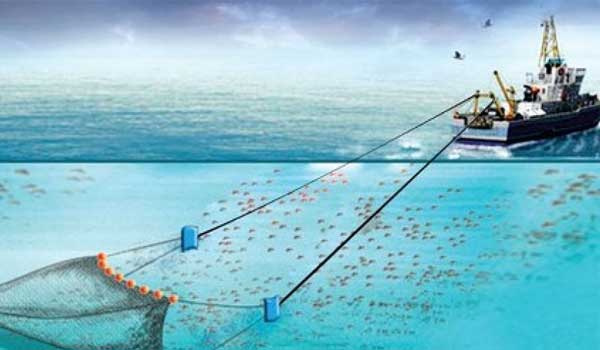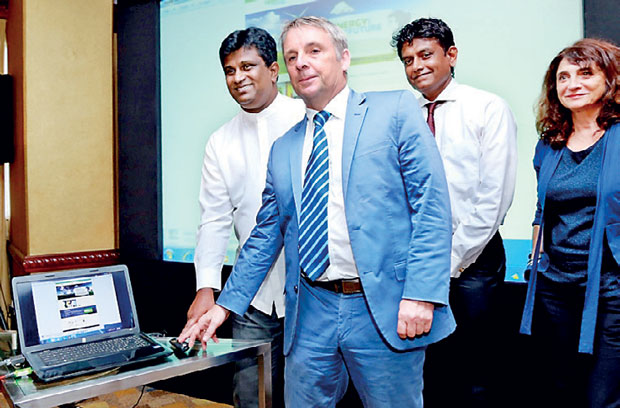
New Bill to strengthen laws against illegal fishing

A Bill to further strengthen the legal framework against illegal fishing methods including bottom trawling will be tabled in Parliament today (6th July), said Minister of Fisheries and Aquatic Resources Development and State Minister of Maheweli Development Mahinda Amaraweera yesterday. (CDN)
Source – Ceylon Today, See more at – http://www.ceylontoday.lk/article20170401CT20170930.php?id=5592

HVA Farms dismiss environmentalist claim Lands were acquired through SC – Chairman

By Umesh Moramudali and Rathindra Kuruwita
Chairman of HVA Farms Rohan Fernando asserted that lands belonging to the group were acquired through the Supreme Court, and permission was granted to conduct farming. He made this comment in response to an allegation made by environmentalist Sajeewa Chamikara, who in an interview carried by Ceylon Today last week, claimed that the HVA farms procured lands through illegal means.
Fernando added, it was the government that identified the 225 acres given to HVA Farms and stressed they do not want to cut down trees. In fact out of the land given HVA Farms can utilize only 60 per cent as it maintains all wooded areas in its natural habitat.
Excerpts:
Q: Can you give an overview of HVA farms and about its operations?
A: HVA Farms is a company started in 1995 to go into organic agriculture. This was the time during which the country was in the middle of a bitter war. When starting the farm, we were shown places by the government and Eluwankulma was very vulnerable.
People thought I was crazy to go there and do a business when I could do it without much trouble in Colombo. But my theory was that businesses need to go there as the people in these areas have suffered. These were the areas in which Tamils and Sinhalese live side by side and most of the Sinhalese have married Tamils and it was an integrated society. Now most of the inhabitants in this area are Muslims.
There was potential and also the risk factor. It was the MPs in these areas who asked me to come there and assist the people. We did this not with the intention of grabbing land. We are not scouts and we went there based on the requests made with a genuine intention. So our concept was whatever we do, we do it with 100 per cent environment compatibility.
We use traditional agricultural practices, such as using Karadahaiya which is used to make the soil better and increase drainage ability.We use these things.
We do not even let urea into the soil as it could result in contamination of the water belt. We collect the urea and use it for the manufacture of compost. These are the concepts we are practicing at present.
We also use solar power. We are one of the pioneers to use solar pumps and we even use the same power to generate the electric fences to prevent the movement of elephants.
Going back to the start of this farm we were provided 25 acres from the government on an annual lease to cultivate crops. However we informed the authorities that this was not viable and therefore suggested a larger land area of 500 acres for commercial agriculture.
The agriculture sector can be developed only through commercial crops where small farmers can be benefited as well since their productions are purchased at the farm gate.
By 1996, the government was very happy on our progress and the relevant authorities visited the farm during the same year.
Chairman of the North -Western Environment Authority Saman Ekanayake also visited the farm and later 500 acres of land was allocated to us.
We were told to proceed with the Environment Impact Assessment (EIA).
We had also received approval from the Wildlife Ministry, the Environmental Authority, the Archeological Department, the Road Development Authority (RDA) and several environment associations.
Then the Non Governmental Organisations (NGOs) came on to the scene. They made a huge fuss over it and went to the court and took an injunction against the farm. By then 25 acres had already been cultivated and we were exporting Papaya. The court injunction was delivered even without a proper inquiry and we were banned from entering the farm.
The claim by the NGO’s was that we had felled trees in order to cultivate Papaya. Technically we did not cut a single tree. Instead we only cleared the bush and the undergrowth. Anything beyond that was not cut. Then we went to the Supreme Court. The SC decided to remove the injunction and allowed us to proceed. The highest court in the country realized that we were mistreated. The Supreme Court even stated that organic agriculture farming is the best model for Sri Lanka.
It was the government that identified the 225 acres and provided it to us. The North Western Province Environment Authority issued documents with guidelines on conducting the operations. All the trees were numbered and we were instructed not to cut any large trees. We also do not want to cut trees since we are not loggers. In fact out of the land given we can utilize only 60 per cent as we have left all the wooded areas intact.
I informed the Supreme Court that I could carry out a similar project in Malaysia as the authorities in that country had pledged to provide us 5000 acres of land. However the Supreme Court insisted we carry out the project in the country and even added that our project is a very good example.
Fifty acres were also required for water reservation.
If we had violated a single law would the Supreme Court allow us to proceed? How can these NGOs claim that we have occupied the land illegally? If they have issues they can go to the Supreme Court instead of spreading incorrect information.
These guys are trying to oust me from the farm. It was not me who decided about the land it was the government surveyor who did this. So they should take then matter up with him. There is a racket going on with the support of the wild life officials and others.
We have learnt to live with the wild life. That includes dealing with elephants. So far we have not had any human elephant conflict on our farm.
There are a lot of issues. I am a fighter and I will fight this out.
What we will have in 175 acres is a similar project. We need to build barn houses, Scottish style in which roofs are solar panel and later we are hoping to promote agri tourism as well. We will use solar power for these projects as well. We have a good system to get water and our wells are clean. People in the area also use water from our wells. We want to make this place free of CKDU by having clean water. We also hope to plant 100,000 trees as well.
Q: How many have you employed in your farm? And how many indirect beneficiaries?
A: we have 100-200 direct employees and unlimited number of people benefit from the project as we purchase the harvest from the farmers at the gate. We are developing a branded certified product. We have a trade network in 40 countries. A lot of people are seeking safe food today hence organic products has a demand. Also it is important to sell organic products to the local market.
Even now we are late on organic farming. But we need to start giving prominence to this method. There are a lot of organic properties that we can use for farming, not merely biomasses. We have enough and more organic pesticides. Kohomba, garlic and Perumkayam are good examples. We use a lot of experiments in using these. We have an in-house research department and we do a lot of studies linked to production and organic agriculture.
Q: You spoke about concentrated compost. Is that an expensive product?
A: It depends on how you look at the produce. Also organic agriculture keeps the soil alive. In Sri Lanka, due to theamount of chemicals put into the earth, the soil is dead. That has become a serious concern. You see a lot of sicknesses such as CKDU. A lot of farmers are sick.
Q: You spoke about the importance of giving people access to healthy food. However organic food is expensive inSri Lanka and most organic products are exported. What should be done to make organic food more available to the people?
A: Organic products should not cost more. It should be given it at the same price. The matter is that since it’s a new thing people are paying a premium and buy it. But there exists a myth that the cost of production of organic products is more. That is not true. The biggest cost in agriculture is labour. Therefore, we are thinking about purchasing machines since they are cheaper and more efficient.
Source – 10/07/2017/ Ceylon Today, see more at – http://www.ceylontoday.lk/article20170401CT20170930.php?id=5632

Green Energy Champion 2017 campaign launched

Increasing awareness for energy efficiency, becoming less dependent on fossil fuels and reducing carbon dioxide emissions – these are main targets of Sri Lanka’s current energy policy.
The country has excellent conditions for using solar energy, biomass, hydropower and wind energy. The German Federal Foreign Office together with the Power and Renewable Energy Ministry of Sri Lanka and the project implementing partner Deutsche Gesellschaft für Internationale Zusammenarbeit (GIZ) GmbH and Sri Lanka Sustainable Energy Authority have been working closely together to make Sri Lanka’s energy transition
a success.
Recently, all involved partners launched the second round of the Green Energy Champion Sri Lanka initiative, a countrywide competition identifying and recognizing innovative ideas on improving energy efficiency and encouraging the use of renewable energy in the country. 
The launch event was graced by Sri Lanka Power and Renewable Energy Deputy Minister Ajith P. Perera and Sri Lanka and the Maldives German Ambassador Jörn Rohde.
The Green Energy Champion 2017 launch comes post a very successful first project phase last year in which 700,000 media users were reached with energy-saving tips and background information on renewable energy. Ananda College Colombo was declared as the winner of the first countrywide competition for their holistic approach to energy efficiency.
Their award-winning project, which was implemented in autumn 2016, included the installation of a solar PV system, which generates over 24,000 kilowatt hours annually, the upgrading of the school’s composting system and the introduction of a solid waste management system. Further, several awareness trainings with more than 7,000 students and teachers were carried out.
Now the initiative is looking for another blueprint ‘Green Energy Champion’, who would become a showcase for sustainable and clean energy solutions. The winning entry would be awarded with technical equipment worth up to Rs.10 million (60,000 euros) and technical expertise for its implementation.
The competition intends to inspire Sri Lankans to submit tangible ideas how to use renewable energies in their environment. A questionnaire will guide them to compose an action plan together with an estimated budget.
After all applications have been screened, the representatives of the five most promising ideas will be invited to a workshop to practice their communication and management skills and receive further input on renewable energies, energy efficiency and technical feedback on the proposal presentations.
At the end of the workshop the participants will pitch their ideas. The winner will be determined by a jury comprising of representatives of the German Embassy, Power and Renewable Energy Ministry, Sri Lanka Sustainable Energy Authority and GIZ.
During the launch event, Rohde said, “Climate change is a major challenge of our time. We need to adjust the way we generate and consume electricity. I am sure that our Green Energy Champion campaign triggers many Sri Lankans to submit innovative renewable energy ideas, which help their country to make its energy transition a reality. Germany will continue to support Sri Lanka’s path to a sustainable green energy future.”
Source – DailyMirror, See more at – http://www.dailymirror.lk/article/Green-Energy-Champion-campaign-launched-132204.html



